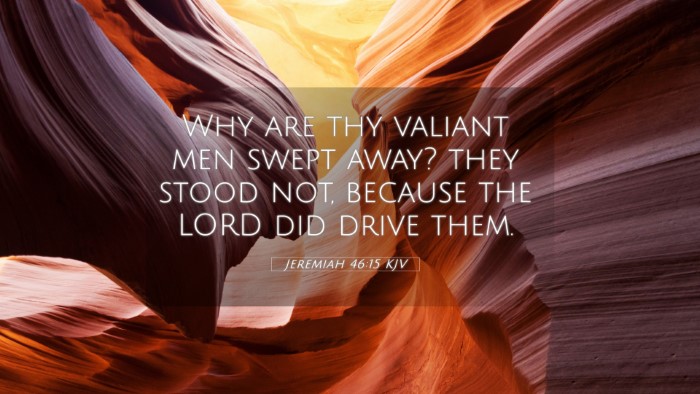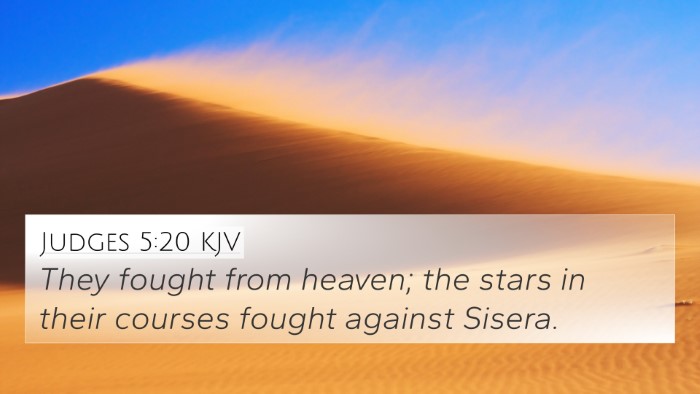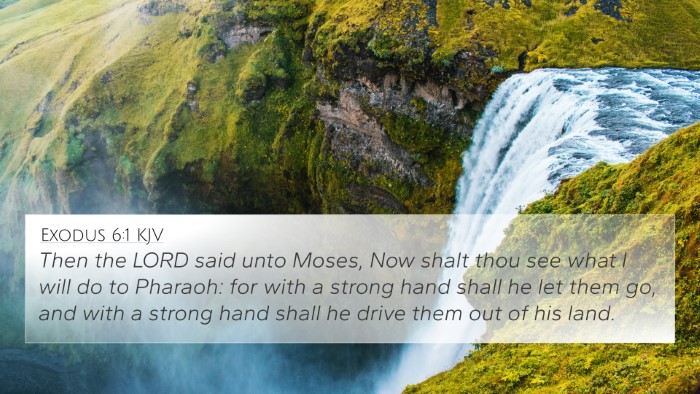Understanding Jeremiah 46:15
Jeremiah 46:15 states:
"Why are thy valiant men swept away? they stood not, because the LORD did drive them." (Jeremiah 46:15 KJV)
Verse Meaning and Interpretation
This verse is situated within a prophecy concerning Egypt, particularly during its impending defeat by Babylon. Various commentaries analyze this verse to provide insights into its meaning and context.
- Matthew Henry: Matthew Henry emphasizes the concept of divine sovereignty. He notes that the Egyptian warriors, despite their courage and preparation for battle, are ultimately powerless against the will of God. The phrase "the LORD did drive them" suggests divine intervention as a decisive factor in the course of human events.
- Albert Barnes: Barnes elucidates that this verse highlights the futility of human strength when placed in opposition to God’s will. He draws attention to the moral and theological implications, suggesting that no matter the might of a nation like Egypt, they cannot withstand the plans set forth by the Almighty.
- Adam Clarke: Clarke delves into the specifics of the imagery presented in the verse. He expresses that the scattered and defeated valiant men reflect a deeper lesson on reliance—indicating that true strength lies not in military might, but in submission to God's authority and purpose.
Cross-References Related to Jeremiah 46:15
This verse connects strongly with several other scriptures, reinforcing its themes of divine sovereignty and the futility of opposing God's plans. Below are cross-references that provide deeper insight:
- Isaiah 10:15: "Shall the axe boast itself against him that hews therewith?" - Examining God’s power over nations and their leaders.
- Proverbs 21:30: "There is no wisdom, nor understanding, nor counsel against the LORD." - Highlighting the futility of any strategies that oppose God.
- 2 Chronicles 20:15: "Thus saith the LORD unto you, Be not afraid nor dismayed by reason of this great multitude; for the battle is not yours, but God’s." - Emphasizing God's control in battles.
- Psalm 33:10-11: "The LORD bringeth the counsel of the heathen to nought: he maketh the devices of the people of none effect." - God’s intervention in worldly affairs.
- Jeremiah 48:25: "The horn of Moab is cut off, and his arm is broken, saith the LORD." - Illustrating God's judgment on nations.
- Romans 9:19-21: "Thou wilt say then unto me, Why doth he yet find fault? For who hath resisted his will?" - Paul speaks on God's authority over creation.
- Ephesians 1:11: "In whom also we have obtained an inheritance, being predestined according to the purpose of him who worketh all things after the counsel of his own will." - God governs all things according to His desires.
- Revelation 17:14: "These shall make war with the Lamb, and the Lamb shall overcome them: for he is Lord of lords, and King of kings." - The ultimate triumph of God's plan in the end times.
Thematic Connections
In addition, when exploring the connections using tools for Bible cross-referencing, we notice thematic links:
- Covenantal Faithfulness: The passage reflects on God's unwavering commitment to His purposes, linking to passages like Deuteronomy 7:9, which discusses God's faithfulness to His covenant.
- Divine Judgment: The notion of judgment found in this verse resonates with themes in Isaiah 13:11, where God expresses accountability towards the wicked.
- Human Weakness: The acknowledgment of human limitations is echoed in Psalm 20:7: "Some trust in chariots, and some in horses: but we will remember the name of the LORD our God."
- Victory through Humility: The call to rely on God’s strength, found in 2 Corinthians 12:9, is parallel to the messages contained in Jeremiah 46:15.
Practical Application in Study
Exploring Jeremiah 46:15 and its nuances encourages believers to reflect on their circumstances. When faced with challenges, they can remind themselves of the absolute sovereignty of God in any battle or struggle.
- This passage can be used in Bible cross-reference guide methods to study the nature of God's omnipotence.
- Understanding the futility of human endeavor without divine support aids in building faith.
- By engaging with these passages topically, students of the Bible can enhance their overall comprehension of interconnected themes.
Conclusion: Reflections on Divine Authority
In summary, Jeremiah 46:15 serves as a poignant reminder of the limitations of human strength when juxtaposed with the might of the Divine. It encourages the faithful to trust in God’s providence and to engage in a deeper study of scripture, leveraging tools for comprehensive Bible cross-reference analysis to enrich their understanding of God’s character and His actions in history.













